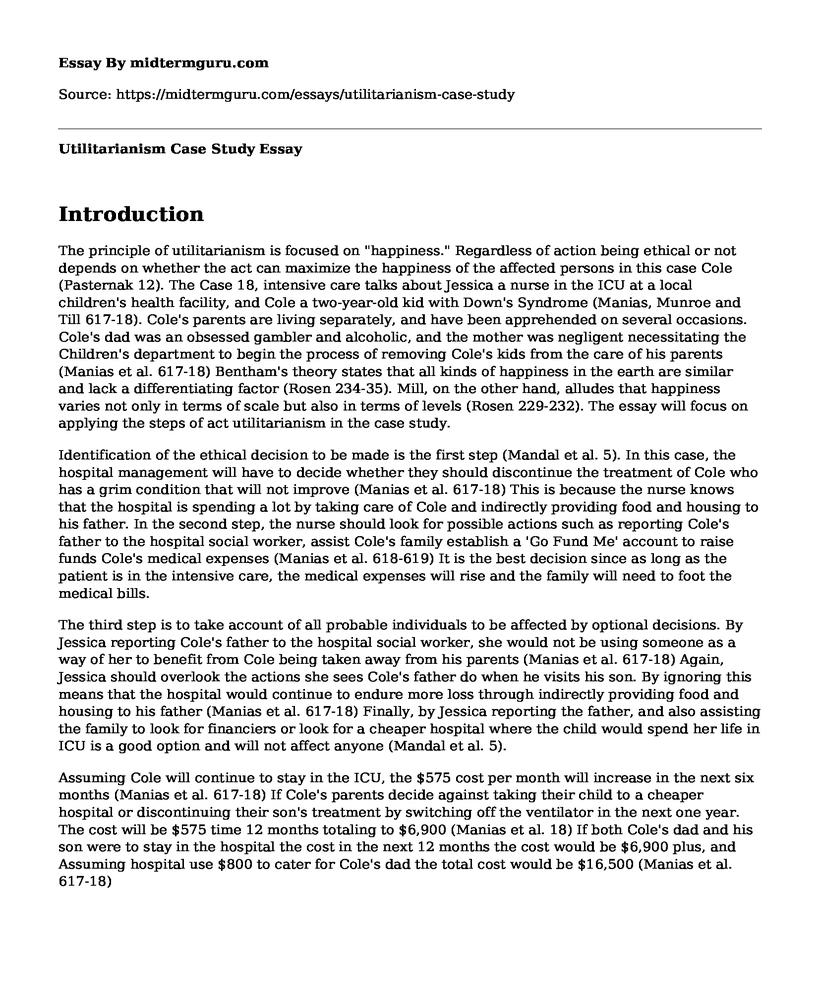Introduction
The principle of utilitarianism is focused on "happiness." Regardless of action being ethical or not depends on whether the act can maximize the happiness of the affected persons in this case Cole (Pasternak 12). The Case 18, intensive care talks about Jessica a nurse in the ICU at a local children's health facility, and Cole a two-year-old kid with Down's Syndrome (Manias, Munroe and Till 617-18). Cole's parents are living separately, and have been apprehended on several occasions. Cole's dad was an obsessed gambler and alcoholic, and the mother was negligent necessitating the Children's department to begin the process of removing Cole's kids from the care of his parents (Manias et al. 617-18) Bentham's theory states that all kinds of happiness in the earth are similar and lack a differentiating factor (Rosen 234-35). Mill, on the other hand, alludes that happiness varies not only in terms of scale but also in terms of levels (Rosen 229-232). The essay will focus on applying the steps of act utilitarianism in the case study.
Identification of the ethical decision to be made is the first step (Mandal et al. 5). In this case, the hospital management will have to decide whether they should discontinue the treatment of Cole who has a grim condition that will not improve (Manias et al. 617-18) This is because the nurse knows that the hospital is spending a lot by taking care of Cole and indirectly providing food and housing to his father. In the second step, the nurse should look for possible actions such as reporting Cole's father to the hospital social worker, assist Cole's family establish a 'Go Fund Me' account to raise funds Cole's medical expenses (Manias et al. 618-619) It is the best decision since as long as the patient is in the intensive care, the medical expenses will rise and the family will need to foot the medical bills.
The third step is to take account of all probable individuals to be affected by optional decisions. By Jessica reporting Cole's father to the hospital social worker, she would not be using someone as a way of her to benefit from Cole being taken away from his parents (Manias et al. 617-18) Again, Jessica should overlook the actions she sees Cole's father do when he visits his son. By ignoring this means that the hospital would continue to endure more loss through indirectly providing food and housing to his father (Manias et al. 617-18) Finally, by Jessica reporting the father, and also assisting the family to look for financiers or look for a cheaper hospital where the child would spend her life in ICU is a good option and will not affect anyone (Mandal et al. 5).
Assuming Cole will continue to stay in the ICU, the $575 cost per month will increase in the next six months (Manias et al. 617-18) If Cole's parents decide against taking their child to a cheaper hospital or discontinuing their son's treatment by switching off the ventilator in the next one year. The cost will be $575 time 12 months totaling to $6,900 (Manias et al. 18) If both Cole's dad and his son were to stay in the hospital the cost in the next 12 months the cost would be $6,900 plus, and Assuming hospital use $800 to cater for Cole's dad the total cost would be $16,500 (Manias et al. 617-18)
Conclusion
In conclusion, Jessica was a genuine act utilitarian, she would have to follow strictly the hospital rules by reporting Cole's father to the hospital social worker. After reporting the father, she would be also required to help them find alternatives to foot the expenses of the incurred by the hospital and also Cole's situation. The ethical right for Jessica, in this case, is to report the father and assist them look for a financier or a cheaper hospital who are care beyond cost. The best thing is for the child to look for a cheaper hospital that will provide care for the child until he recovers or kicks the bucket. The option will give maximum happiness to the family.
Works Cited
Mandal, Jharna, Dinoop Korol Ponnambath, and Subhash Chandra Parija. "Utilitarian and deontological ethics in medicine." Tropical parasitology 6.1 (2016): 5.
Manias, Nicholas, Dave Munroe and Jane. E. Till. "Ethics Applied (7th Edition)." 2013.
Pasternak, S. "The role of ethical theories in ethical reasoning and behaviour within organisations." Unpublished Research Proposal Submitted to the Faculty of Management, Tel Aviv University. Available from www. ti-isreal. org/.../dbs-Atachedfiles/sigalitPasternak. pdf (2012). 1-37 pp.
Rosen, F. (2005). Classical utilitarianism from Hume to Mill. Routledge.
Cite this page
Utilitarianism Case Study. (2022, Sep 12). Retrieved from https://midtermguru.com/essays/utilitarianism-case-study
If you are the original author of this essay and no longer wish to have it published on the midtermguru.com website, please click below to request its removal:
- Mid Term Questions on Globalization: Marx, Giddens, Weber
- Essay on Social Ethics in Action
- Paper Example on Plato's Ethical Assessment
- Essay Sample on Plato and Rachel's Concepts of the Origins and Value of Selfishness
- Ethical Theories - Assignment Example
- Residents of Prinsloo vs Oil Refinery: An Ethical Dilemma - Essay Sample
- Psychologists' Ethical Duties: Safeguarding Rights for Effectiveness - Essay Sample







